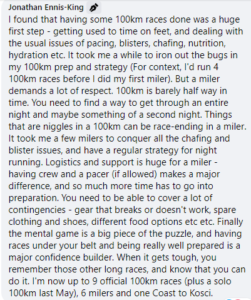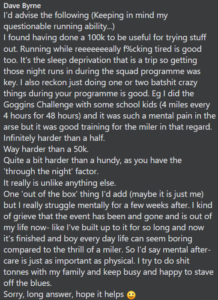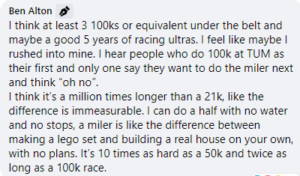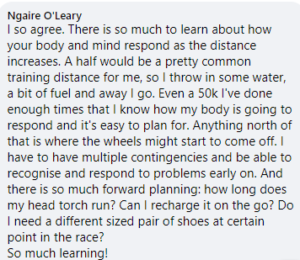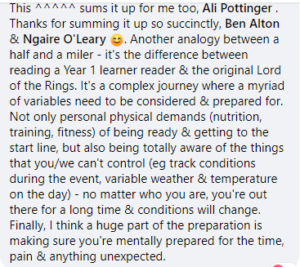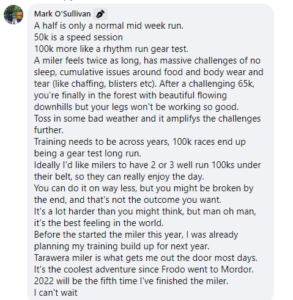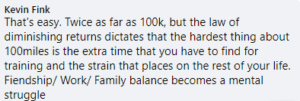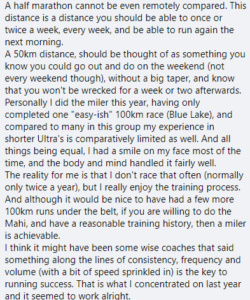The 100 mile distance, for many it’s the ultimate distance challenge.
So how do you know if you have what it takes to toe a 100 mile start line?
This is a question, that in our role as coaches, we get a lot of.
- ‘Can I?’
- ‘Should I?’
- ‘How do I know if I am ready?’
We have coached several hundred runners to 100 mile finish lines over the years.
We’ve also spent several hundred hours on 100 mile finish lines.
We’ve cheered fresh faced runners who are stepping out of their comfort zone, and onto that 100 mile start line and then welcomed them back with cheers, tears, and hugs.
The runners are weary and slightly bleary eyed, arriving back only a few kms from where they started 15 to 36 hours later completing their ‘journey’.
Last year I thought I’d sit down and think about what it takes to complete the Tarawera 100 miler.
Of those hundreds of athletes, What did these runners have in common?
What should people have under their belt to give this mammoth beast a crack?
So here we go, the miler WoF (RWC in Aus).
#1 Experienced numerous ultra’s
When giving someone a ‘green for go’ we like to have seen someone run numerous ultra’s of varying distances. Probably quite a number of 50’s or marathons, and then some 50 mile or 100km races. In the year before someone takes on a miler we like to have them run at least an 80km or 100km race as part of their build. Ideally a good while out from race day so that their training isn’t impacted. This is the approach we like to take with the runners we work with.
The other thing I consider when looking at someone’s experience is how you have finished those ultra’s. I knew one of the ladies I coach was ready to tackle the Tarawera 100 miler when I saw her rock up to the finish line of Taupo 100km looking like she still had plenty left in her.
So consider your ultra experiences..
- Were you a blistered mess?
- Did you battle GI for each of them and still haven’t found the recipe for success?
- Did you bring an injury to the finish line with you?
- How was your mental state when doing these?
- Could you have kept going for another 6-18 hours?
#2 Prepared and organised AND #3 Good at solving problems and has the tools to do it
These two really go hand in hand. Have you got what you need in the right drop bags? Have you got what you need in your pack?
Lube? Foot triage kit? Alternative fueling and hydration options? Sunscreen? Warm Clothes? Adequate headlamp and spare batteries? Spare socks or shoes? A prepared crew? A prepared pacer?
The list goes on. People that have troubleshooted any areas for failure can mitigate those potential risks and deal with them on race day.
#4 Trained consistently with decent volume.
This comes with a disclaimer that everyone is different and can withstand different training loads, what might be light for one person is too much for another. So when it comes to miler training you have to do what is right for you, and not get caught up with what old mate John from down the road is doing. This goes for pretty much any distance.
We like to see runners hitting at least 80-120km weeks through October, November, December and then tapering down in January. These months do include hiking. More isn’t always more with training. Especially for the runners that we coach, who are normally people with full time jobs, families, pets, and other commitments. There’s a lot of energy being invested in a variety of areas, not just your running training so it all has to work and be sustainable, but likewise it’s also not a race that you should go into just trying to ‘blag it’. This race distance deserves respect so bring it to the table with appropriate training volume.
#5 Done some conditioning runs
These are important for miler training. Weird sh!t that your coach dreams up to help condition you mentally and physically for what you are going to take on.
I’m talking about things like through the night runs, back to backs, and lots of other ‘spicy’ stuff that will get you outside your comfort zone.
There’s a difference between a weekly long run and a miler specific conditioning session.
#6 Tapered!!!!
Go into the race fresh and ready to go.
One of the biggest mistakes we see runners make is carrying massive training mileage and fatigue into their main event. The training you do in the month leading into your miler will greatly effect your energy reserves on race day. If you don’t know the difference between productive adaptations in the sharpen phase and detraining, talk to a professional and get guidance through this vitally important period.
#7 Dialled in nutrition and hydration
This is something that should be nailed from your years of training and ultra experience. This is a huge topic but by the time you stand on the start line for 100mi you already know it inside and out.
No need to write about it here – right?
#8 Pacing
I repeat, ‘This is something that should be nailed from your years of training and ultra experience’.
#9 Has the mental side and their why sorted.
“Endurance is “the struggle to continue against a mounting desire to stop.” ― Alex Hutchinson, Endure: Mind, Body, and the Curiously Elastic Limits of Human Performance
What will keep you going when the going gets tough?
The longer you go the more the ‘top two inches’ matter.
I’ve also included some bonus points, these are things that really compliment all of the above points.
*Strength Training
If your body is strong and robust it will help you cover the distance. This becomes even more noticeable when the weather is ‘tough’ like the muddy and wet year of 2018.
*A solid, or experienced tramper or hiker.
These people who have experience of multiple days out on their feet on tough terrain, they are worth backing. They can march it out and get it done.
So, that’s it, how did you fare?
Are you ready to take that leap into the unknown?
I hope this doesn’t sound too scary, this is an achievable thing but one that deserves targeting, training, and respect. We’ve seen people from all walks of life nail Tarawera miler. Mums, Dads, Lawyers, Dog Parents, as well as my favourite 60 something year old Granny of 9 Cathie Blade who has done it twice. I will look forward to seeing many more runners receive that treasured pounamu at the finish line in 2022. Will it be you?
I’ve included quotes from some of the amazing runners we have coached who have covered off their thoughts on what it takes to run 100 miles too, there’s some real gems in there.
If you are after any further advice or coaching support we are here and happy to help.


